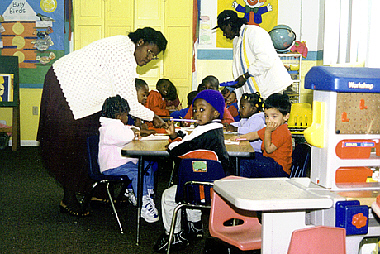General Board of Global Ministries
![]()
UM Information
UM
Reporter
![]()
Florida Southern College
![]()
Bethune
Cookman College
![]()
FL UM Children's Home
![]()
|
|
Ministry struggles to help refugees |
|
Photo By Michael Wacht |
The
day-care center at the United Methodist Haitian Mission in Ft. |
| By Michael Wacht FT. PIERCE — Franz Brinache left his home in Haiti in 1994 to escape the cruelty of the military coup that overthrew President Jean-Bertrand Aristide. He left behind his three children, the oldest of whom was 22. Brinache settled here and started the process of getting his children out of Haiti. He waited for five years to hear from the Haitian government, and during that time asked three immigration assistance agencies for help. He paid almost $300 for their services, but got no results. One ministry of the United Methodist Haitian Mission here did get results for Brinache and is helping many more refugees like him relocate themselves and their families to Florida. Brinache asked the Rev. Luc Dessieux, pastor of the mission, for help last October. "He comes in here and says, ‘Pastor, can you send a letter to the consulate in Haiti to see if I can get my children?’ " Dessieux said. "Three weeks later he gets a letter back with an appointment for his children to talk to immigration. In less than three months, he gets his children. "Someone is talking about what good is done? I did the letter for free and had success. The guy was so happy, and we have so many stories like that in the church." With the successes, however, come setbacks for the 300-member, 10-year-old mission church. Despite having more than 100 children and as many as 80 youth attending each week, the mission does not have a full-time ministry to either group because it lacks volunteers and the financial means to hire staff, Dessieux says. The church is also closing its food and clothes pantries from lack of support and its day-care center because it cannot find a qualified replacement for the director, who found another job. It has cut back on its rent and utility support program until it can find more money. Regardless of the limited funds and support, the need is great. Ft. Pierce is second to Miami in having the highest concentration of Haitian immigrants in the country, according to the Rev. Brice Harris, pastor of First United Methodist Church, Pompano Beach, and chairman of the conference’s Refugee Ministry Task Force. Dessieux said 16,000 Haitians live in Ft. Pierce. The majority of them work in the area’s citrus groves or packinghouses for six months of the year, and 80 percent are functionally illiterate. Many send money to Haiti to help support family members still living there. Dessieux said many of the congregation’s members "try to do the best they can to pay their tithe." The church also receives support from the Melbourne district and its Board of Church Extension. Dessieux is also applying for grants. The mission received a $2,000 grant last November from the Florida Conference Church and Society Ministry team that was funded by the conference’s share of the annual Peace With Justice Special Sunday offering. It will help the church expand its ministry to people like Brinache, according to Dessieux, who says his church is helping as many as 150 people deal with their own or a family member’s immigration challenges. For many of them the greatest hardships are translating and completing forms and paying associated fees. The fee to apply for permanent residency is $220 per person, up from $95 a year ago, Dessieux said. The form to petition for a family member to travel to the United States is $110, up from $80. The mission is also working to unite the Haitian community and improve its standing in the larger community, Dessieux says. Currently, there are no Haitians serving in local government and very few in organizations like the police department, hospitals, banks and the courthouse. Through the Haitian-American Citizens Club founded by Dessieux in 1995, he and others are petitioning public and civic offices and major employers to hire Haitians. He said the police department has recently hired Haitian officers, one of whom is a member of the mission. Despite its challenges, Dessieux said his church does have a plan. "Our first responsibility is to preach the gospel and save as many souls as we can," he said. "And through some difficulties, we try to see how we can do social services to keep the community moving." Top
of this page |

